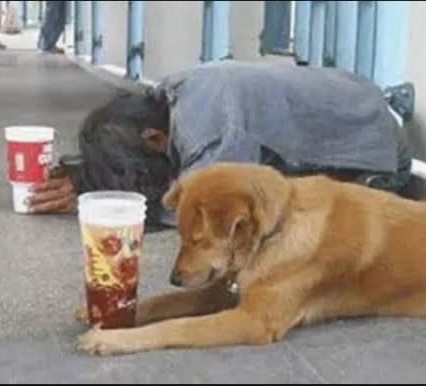
A policeman’s son befriends a homeless man and his dog and brings them food every day. Then the dog appears unexpectedly and alerts him to an injustice.At twelve, Brian Devlin was small for his age, and not very athletic. His father, Gary, didn’t really understand his shy, bookish son. His son was nothing like him…
He had been a tall, strapping, boisterous boy, always up to his ears in mischief. Gary tried to build his son’s self-confidence, but the harder he tried, the more Brian seemed to pull away.
Brian was smart, that Gary couldn’t deny, and he had a scholarship at a prestigious private college on the other side of town. The boy was scared of taking a bus, but since the school was close to his work, Gary picked him up every afternoon.
Gary was a desk Sargeant at the local precinct, and by the time his work ended at 5:00 p.m., the school day was long over. In the winter, Brian waited in the library and did his homework. But in the summer, he sat on the school steps and waited for his dad, soaking up the sunshine.
One afternoon, when Gary arrived, Brian wasn’t on the steps. He was outside the school gates petting a dog. Brian looked up at his dad with a happy grin.
Don’t make assumptions about people before you know who they are.
“Look, Dad,” he cried, then he said to the dog, “Dance!”
The dog hopped up onto its back legs and did a little jig, front paws up in the air and its tongue lolling out happily.
“Isn’t that so cool?” the boy asked.
“Yes,” Gary said, surprised by the enthusiasm Brian was showing. “Whose dog is that?”
“It’s Carl’s,” Brain said, and pointed at a man sitting on the pavement and leaning back against the school fence. The man was in his forties and he was clearly homeless.
A ragged bundle of blankets lay on the ground next to him, and he was unshaven. The dog, however, was well cared for. It was a Golden Retriever, and its fur was groomed and gleaming.
The man shrank back when Gary looked at him, so he said to his son, “Come on, now, it’s time to go.”
On the way home, Gary said, “Listen, Brian, I want you to stay away from that man and his dog, OK?”
“Carl’s OK and I love Goblin!” Brian protested.
“Goblin?” Gary asked. “Is that the dog’s name? Well, I’m sure Goblins’ a good dog, but I don’t want you befriending vagrants, Brian. Do you understand?”
“But dad…” Brian protested.
“Not another word,” Gary snapped.
The next day, when Gary came to fetch Brian, the boy was studiously sitting on the steps reading a book, but that night, his wife co
mplained that half a roast chicken was missing.
“I don’t understand!” she cried. “I set it aside to make sandwiches for Brian’s lunch and now it’s gone!”
Gary looked over at Brian and the boy looked so innocent that he was immediately suspicious. Was Brian taking food to school for that vagrant and his dog?
Gary started keeping an eye on the pantry and noticed that tins of sausages kept vanishing. He now knew that his son was stealing so he could feed the dog and the homeless man every day. Gary felt a pang.
His son, who had such difficulty making human friends, had bonded with the dog. It was a pity it belonged to a vagrant, a man who might be dangerous.
Two days later, Gary got off work early and when he arrived at the school, he caught Brian outside the gates. He had a bag in his hand and he was saying: “Hey guys, I have your favorite spaghetti, Carl. And for you boy, your favorite sausages!”
“BRIAN!” he thundered. “What are you doing?”
The boy looked up at him, and for the first time, Gary saw fear in his son’s eyes. Immediately he felt a surge of anger
It was this derelict’s fault that his son was afraid of him! He stepped forward and clenched his fists. “Get away from that man,” Gary shouted. “Get into the car!”
That night, Gary and his wife sat down and talked to Brian about the dangers of befriending strange men. Brian shrugged it off. “Dad, I know about stranger danger and bad touching. Carl is NOT like that, he’s nice. You can tell he’s a good person because Goblin loves him so much, and Goblin’s the BEST, smartest dog.”
“Brian,” Gary said quietly. “I’m sure Goblin’s a great dog, but you know what? Hitler had a great dog and he loved him, and I’m sure the dog loved him back. A good dog does NOT make this vagrant a good person. Please stay away from him, Brian!”
“NO!” shouted Brian, and he pushed back his chair. “Carl is my friend and I love Goblin! Why do you always have to spoil everything? I HATE YOU!”
That night, Gary made a decision. He was going to solve this problem his own way…
That Saturday, Brian woke up early to the sound of anxious barking. He thought sleepily, “That sounds just like Goblin!”
Brain jumped out of bed and looked out of his window. It WAS Goblin, and he was standing on the porch barking anxiously and looking very unhappy.
“Goblin!” Brian cried as he opened the door, and immediately the dog ran to him. Goblin put his head in Brian’s lap and started whining. “What’s wrong, boy? Where’s Carl?”
But the dog just whined and shivered so Brian decided to do something he’d always been afraid to do before — go to his dad’s work and ask for his help.
Gary was stunned when he saw Brian at the precinct with the dog by his side. “Brian!” he gasped. “What are you doing here? How did you get here?”
“Dad!” he cried. “I think something bad happened to Carl. Goblin came looking for me and he’s very scared…” But Goblin wasn’t looking scared, he was looking up at Brian’s dad and growling.
Brian had never heard Goblin growl before. “Dad!” he asked. “What have you done?”
Gary flushed. “Carl was loitering near a school and he was warned off twice, so we arrested him!”
“But dad!” Brain cried. “He did nothing wrong! He’s not well, he needs help…You don’t know anything about him! He’s a veteran and he was in the bomb squad and he worked with sniffer dogs to find explosives. That’s why Goblin’s so well trained. He’s a good man and you arrested him because he’s sick!”
“He’s not SICK!” Gary cried angrily. “He’s a bum!”
Brian had tears in his eyes. “No, dad,” he said softly. “He doesn’t drink or anything, and most of the time he talks to people who aren’t there. He needs help.”
Gary was ashamed of himself, mostly because he couldn’t admit that there was a part of him that was jealous of Carl and his easy friendship with his son.
He did some investigating and discovered that Carl had a sister in a neighboring state who had been looking for him for years. He contacted Carl’s sister and she was overjoyed.
She took Carl home and enrolled him in an outpatient mental health clinic immediately. Goblin went too, of course. Brian missed Carl, but mostly he missed Goblin.
Then one day his dad came home with a big grin on his face and a strange lump under his jacket. He lifted out a wriggling puppy and presented it to Brian. “There you go,” he said. “You have to name him!”
Brian started crying, he was so happy. “Goblin,” he gasped. “His name is Goblin Two!”
What can we learn from this story?
Don’t make assumptions about people before you know who they are. Gary assumed Carl was a drunk and a danger before he knew anything about him.
Kindness and compassion are the greatest of virtues. Brian’s empathy led him to befriend Carl, and he helped him find his way back home.
Men May Get Hurt More Than Women During a Breakup, and Here’s Why
Breakups are never easy. They bring a whirlwind of emotions, self-reflection, and sometimes, heart-wrenching pain. While it’s commonly believed that women are more emotional during a breakup, recent studies suggest that men may actually experience more emotional distress than women.
Why is that? The answer lies in a mix of psychological, societal, and emotional factors that shape how men handle breakups. Let’s dive into the reasons why breakups tend to hit men harder and what they can do to recover.

Men and Emotional Vulnerability: A Silent Struggle
From a young age, men are often conditioned to suppress their emotions. Society teaches them that showing vulnerability is a sign of weakness. While women are encouraged to express their feelings and seek support, men are more likely to bottle up their emotions.
This emotional suppression can be damaging. When a breakup happens, men might not have a strong support system in place to help them process the pain. Many men rely on their romantic partners as their primary emotional support, so when that relationship ends, they often feel lost and alone.
Without an outlet to talk about their feelings, men may struggle with feelings of sadness, loneliness, and even depression—sometimes much more intensely than women.
Societal Expectations: The Pressure to “Man Up”
One of the biggest reasons men struggle with breakups is the pressure to “man up” and move on quickly. Society often expects men to show emotional resilience, discouraging them from expressing grief or sadness.
Women, on the other hand, are more likely to seek comfort from friends, discuss their emotions, and actively work through their pain. Men, however, are often expected to act as if nothing has happened.
This need to maintain a tough exterior can prolong the healing process. Instead of working through their emotions, men might turn to distractions like excessive work, alcohol, or rebound relationships—only to find that the pain resurfaces later.
Why Romantic Relationships Matter More to Men
Men and women often approach relationships differently. While women tend to build multiple sources of emotional support through friendships and family, men frequently rely on their romantic partners as their main source of emotional intimacy.
When that relationship ends, it’s not just the loss of a girlfriend or wife—it’s the loss of a best friend, a confidant, and sometimes, their only emotional support system.
This can make the breakup feel like a double hit, leaving men struggling not only with heartbreak but also with a deep sense of emotional isolation.
Delayed Grief: Why Men Take Longer to Heal
Men and women grieve breakups differently. Women tend to feel the emotional pain more intensely at first, but they also process it faster by talking about it and seeking closure.
Men, however, often delay confronting their emotions. Instead of immediately processing the pain, they may distract themselves with work, hobbies, or casual relationships. But unresolved feelings don’t just disappear—they resurface later, sometimes in the form of depression, anxiety, or a lingering sense of emptiness.
This delayed emotional response can make breakups more painful for men in the long run, prolonging the healing process.
The Role of Attachment Styles in Breakup Pain

Attachment styles—the way people form emotional bonds—also play a role in how men experience breakups. Studies suggest that men are more likely to have an avoidant attachment style, meaning they struggle with emotional closeness but still feel deeply affected when a relationship ends.
This paradox can make breakups especially painful for men. On one hand, they may try to act indifferent and suppress their feelings. On the other hand, they might secretly feel heartbroken and unable to move on.
Women, by contrast, are more likely to have secure or anxious attachment styles, making them more willing to process and express their emotions.
Men Tend to Romanticize Past Relationships
Another reason men may suffer more after a breakup is that they often romanticize their past relationships. Instead of focusing on why the relationship ended, they tend to idealize the good times and overlook the problems.
Women, on the other hand, are more likely to process a breakup by analyzing what went wrong. This approach helps them gain clarity and move forward.
For men, however, this nostalgia can trap them in a cycle of regret and longing, making it even harder to let go and heal.

The Physical Impact of Breakups on Men
Breakups don’t just affect emotional health—they take a toll on physical health as well. Research suggests that men are more likely than women to experience:
- Sleep disturbances (insomnia or excessive sleeping)
- Changes in appetite (weight loss or gain)
- Weakened immune system (higher stress levels, increased risk of illness)
- Risky behaviors (drinking, smoking, reckless behavior)
Since men are less likely to seek emotional support, the stress of a breakup can manifest physically, leading to long-term health problems.
Why Women Heal Faster
Women tend to have healthier coping mechanisms when dealing with a breakup. They are more likely to:
- Talk about their emotions with friends and family
- Seek professional help like therapy or counseling
- Engage in self-care routines, like exercise or journaling
- Reflect on the relationship to understand what went wrong
These strategies allow women to process their emotions faster, helping them heal and move on more effectively than men.
Men, on the other hand, often suppress their pain and avoid dealing with it head-on, which ultimately prolongs their suffering.
How Men Can Heal After a Breakup

If breakups tend to hit men harder, what can they do to heal faster and move forward?
- Acknowledge Your Feelings – It’s okay to feel sad, angry, or confused. Accept your emotions instead of suppressing them.
- Talk to Someone – Whether it’s a close friend, family member, or therapist, opening up can help release pent-up emotions.
- Prioritize Self-Care – Exercise, eat well, and maintain a healthy routine to keep both your mind and body in check.
- Stay Busy, But Don’t Avoid Healing – Engaging in new hobbies or activities is great, but don’t use them as an escape from your emotions.
- Reflect and Grow – Instead of dwelling on what’s lost, focus on what you’ve learned and how you can grow from the experience.
Healing takes time, but taking proactive steps can make the journey smoother and more empowering.
Conclusion: The Emotional Reality of Breakups for Men
While breakups are painful for everyone, men often struggle more due to emotional suppression, societal expectations, and a lack of support systems. Their tendency to avoid emotions, romanticize past relationships, and delay grief can make the healing process more challenging.
However, understanding these factors can pave the way for healthier coping strategies. By embracing vulnerability, seeking support, and focusing on self-care, men can heal and emerge stronger from a breakup.
At the end of the day, heartbreak is a painful but transformative experience. It’s not just about losing someone—it’s about rediscovering yourself, learning from the past, and preparing for healthier, more fulfilling relationships in the future.



Leave a Reply